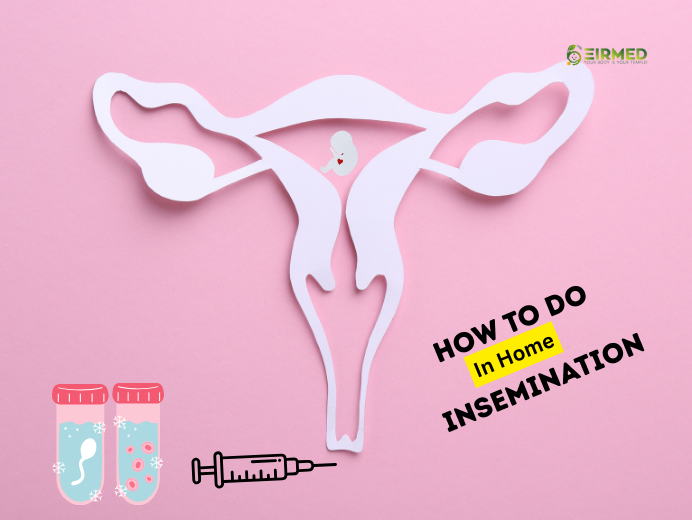How To Do In Home Insemination 2025 | Strong Support for Fertility at Home

7 Essential Steps: How To Do In Home Insemination Safely and Effectively | EIRMED
 How to do in home insemination is a question many people ask when they’re looking for a simple, private way to try for a baby. At EIRMED, we understand that starting or growing your family can feel exciting yet overwhelming, especially if you’re exploring options like this one. Our site helps with fertility medicines and products for both men and women, so you can find what fits your needs. This guide will walk you through everything in clear steps, making sure you have the facts to decide if it’s right for you.
How to do in home insemination is a question many people ask when they’re looking for a simple, private way to try for a baby. At EIRMED, we understand that starting or growing your family can feel exciting yet overwhelming, especially if you’re exploring options like this one. Our site helps with fertility medicines and products for both men and women, so you can find what fits your needs. This guide will walk you through everything in clear steps, making sure you have the facts to decide if it’s right for you.
You might be a couple facing challenges, a single person choosing parenthood, or part of the LGBTQ+ community building your dream family. Whatever your story, home insemination also called intracervical insemination or ICI at home, lets you take charge in a familiar setting. It’s less costly than clinic visits and gives you privacy. But remember, it’s best to talk with a doctor first to check your health and get personalized advice. We’ll cover the basics here, drawing from reliable sources, but this isn’t medical counsel.
What Is Home Insemination and Who Might Choose It?
 Home insemination means placing sperm into the vagina near the cervix using a simple tool like a syringe, without needing a doctor’s office. It’s a form of artificial insemination you can handle yourself. People often pick this when natural ways aren’t working or when using donor sperm.
Home insemination means placing sperm into the vagina near the cervix using a simple tool like a syringe, without needing a doctor’s office. It’s a form of artificial insemination you can handle yourself. People often pick this when natural ways aren’t working or when using donor sperm.
For example, if you’re using sperm from a bank, it’s shipped frozen, and you thaw it at home. Or, if it’s from a partner, you collect it fresh. This method suits those who want to avoid clinic fees or prefer a relaxed environment. Success depends on timing, health, and sperm quality, but many find it a good starting point before trying more advanced treatments like IVF.
At EIRMED, we see folks searching for ways to boost their chances, and we offer supplements that support overall fertility. Think about your goals: Are you ready for the emotional side? Have you thought about legal parts if using a donor? These questions help you prepare.
Preparing Your Body and Mind Before Starting
Before diving into how to do in home insemination, get your body ready. Eat well with fruits, veggies, and whole grains to keep hormones balanced. Exercise lightly, like walking, to stay fit without stress. Avoid smoking, too much alcohol, or caffeine, these can hurt sperm or egg health.
Track your cycle to know when you ovulate. Use apps, temperature checks, or kits that test urine for hormone surges. Ovulation usually happens mid-cycle, say day 14 in a 28-day one. Plan inseminations around then for best odds.
Mentally, talk with your partner or support circle. Read stories from others who’ve done it. At EIRMED, our products like vitamin packs can help nourish your system. See a doctor for tests like hormone levels or ultrasounds to rule out issues.
Gathering the Right Tools and Supplies
To do this safely, you’ll need a few items. A needleless syringe (5-10 ml) is key for placing the sperm. Some use soft cups to hold it near the cervix. Get gloves, a clean container for sperm, and maybe a speculum if comfortable, but it’s not always needed.
If using donor sperm, order from a trusted bank, they screen for diseases and provide thaw instructions. For partner sperm, collect in a sterile cup. Have a quiet space ready, with pillows to prop up hips after.
EIRMED stocks fertility aids like ovulation predictors and supplements. Make sure everything’s clean to avoid infections. Wash hands and tools with mild soap.
How To Do In Home Insemination: A Step-by-Step Process
 Now, let’s get to the heart of how to do in home insemination. Follow these seven steps carefully for safety and better chances.
Now, let’s get to the heart of how to do in home insemination. Follow these seven steps carefully for safety and better chances.
Step 1: Confirm Ovulation Timing
Time it right inseminate 1-2 days before or on ovulation day. Use predictors to spot the fertile window. This boosts sperm meeting egg odds.
Step 2: Prepare the Sperm Sample
If frozen, thaw slowly per instructions, often in warm water for 10-15 minutes. For fresh, collect via masturbation into a cup, avoiding lubricants. Let it liquify for 15-30 minutes.
Step 3: Set Up Your Space
Lie down comfortably, perhaps with knees bent. Dim lights, play calm music. Have everything within reach.
Step 4: Load and Insert the Syringe
Draw sperm into the syringe. Insert gently into vagina, aiming toward cervix, about 4-6 inches. Don’t force it; stop if it hurts.
Step 5: Release the Sperm Slowly
Push plunger gently to release near cervix. Remove syringe carefully.
Step 6: Rest and Relax
Stay lying down for 15-30 minutes, hips elevated with a pillow. This helps sperm travel up. Avoid bathroom right away.
Step 7: Clean Up and Monitor
Dispose of tools safely. Track symptoms; test for pregnancy after two weeks. If no luck, try next cycle.
These steps come from general practices, but adjust based on your doctor’s input.
Boosting Your Chances with Lifestyle Changes
To improve success in how to do in home insemination, focus on health. Take folic acid for baby development, CoQ10 for egg quality. Men can use zinc for sperm health, EIRMED has these.
Sleep well, manage stress with yoga. Avoid hot baths or tight clothes for men, as heat affects sperm. Some add acupuncture, shown to help fertility in studies.
Track multiple cycles; it might take 3-6 tries. Combine with soft cups for better retention.
Understanding Success Rates and Expectations
Home insemination success is about 10-15% per cycle for under-35s, similar to natural but lower than clinic IUI (15-20%). Age matters over 35, rates drop. Donor sperm from banks often works better due to quality checks.
Don’t get discouraged; many succeed after tries. If not, consider clinic help.
Potential Risks and How to Minimize Them
Like any method, risks exist. Infection from unclean tools always sterilize. Allergic reactions to sperm are rare but possible. If using unknown donors, disease risk rises; use screened sources.
Legal issues: In some places, donors might claim rights without agreements. Get legal advice. Multiple pregnancies if over-ovulating.
Minimize by doctor consults, clean practices, and contracts.
Legal and Emotional Considerations
Think about laws home insemination is legal most places, but donor rights vary. Use agreements for clarity.
Emotionally, it can be ups and downs. Join groups for support. Celebrate small steps.
At EIRMED, we encourage holistic views with our resources.
When to Seek Professional Help
If no pregnancy after 3-6 cycles, see a specialist. They might suggest tests or advanced options. Signs like irregular cycles warrant earlier checks.
Clinics offer monitored inseminations for higher success.
Comparing Home Insemination to Clinic Options
Home is cheaper ($10-100 per try) vs. clinic IUI ($1,000+). But clinics wash sperm, improving quality. Home suits early tries; clinic for complex cases.
Real Stories and Tips from Others
Here are real success-stories of at-home insemination (ICI / home kit / DIY method) with links, so you can see how it worked in different situations (timing, kits, donor type etc.). As always, results vary and some stories are anecdotal. I also include quotes / details so you can judge what seems realistic.
Real-Life Success Stories
- Mandi Pitzer’s story — two pregnancies using an at-home insemination kit
Mandi Pitzer struggled to conceive naturally for years. She then used an at-home artificial insemination kit and managed to get pregnant twice doing that.- One of the articles describes how it cost under US$300.
- Another article (The Chronicle) reports “I have two kids thanks to a DIY insemination kit”.
- “A DIY insemination kit gave me the family I longed for” — Raven Comer-Mathis
Raven and her wife decided to try home insemination with a merit-based kit (Mosie Baby) shipped to Texas. She found a donor, bought the kit, timed ovulation, and succeeded. They now have a daughter, Bailey Joelle.- The story emphasizes that balancing work, timing, and stress was tough, but worth it.
- Reddit / community-based stories
- One person in r/queerception says they used a home delivery donor kit (fresh sperm) with basic needle-less syringes, and got pregnant on the first try, both times they tried. (Reference here)
- Another one says they “conceived via ICI with frozen sperm” after 3 cycles — learning curve about timing. (Refernce here)
- There is also a story of a lesbian couple who got pregnant on their 4th at-home ICI attempt using donor B from a bank; earlier attempts (with donor A) weren’t successful. They kept the same process (tracking ovulation, etc), and adjusting donor source made the difference. (Reference here)
FAQ
What tools do I need for how to do in home insemination?
You’ll need a needleless syringe, sterile cup, and ovulation kit. Gloves help too.
How successful is home insemination?
Around 10-15% per cycle, depending on age and health.
Is it safe to use donor sperm at home?
Yes, if screened, but consult a doctor and get legal papers.
When is the best time for insemination?
During your fertile window, 1-2 days before ovulation.
What if it doesn’t work after a few tries?
See a fertility expert for tests and other options.
Can lifestyle changes help?
Yes, healthy eating and stress reduction improve chances.
How much does it cost?
Low for home under $100 per cycle, plus sperm if donor.
Overall Purpose
This guide explains how to do in home insemination safely, with steps, tips, and risks to consider. It helps you prepare your body, gather tools, and time it right for better success. By sharing real insights and boosts like supplements, it empowers you to try this option confidently. At EIRMED, we aim to support your fertility path with info and products, so you feel informed and hopeful about building your family. (79 words)
Disclaimer
This article provides general information only and is not meant as medical advice. Always consult a healthcare professional before trying how to do in home insemination or any fertility method. EIRMED offers products for wellness support, not treatment or diagnosis. Results vary; no guarantees provided. Information based on sources as of September 2025 and may update. Seek expert help for personal health decisions.
Thank You
Thank you for reading this guide at EIRMED. We value your trust and hope it helps your journey. Explore our fertility products for extra support, and reach out with questions. Your family dreams matter to us.

Eirmed is an informational platform dedicated to providing reliable, science-based insights on male and female fertility, reproductive health, and natural conception.

Thank you I have just been searching for information approximately this topic for a while and yours is the best I have found out so far However what in regards to the bottom line Are you certain concerning the supply
Thank You For Your Precious Time and FeedBack
Hi Neat post Theres an issue together with your web site in internet explorer may test this IE still is the marketplace chief and a good component of people will pass over your fantastic writing due to this problem